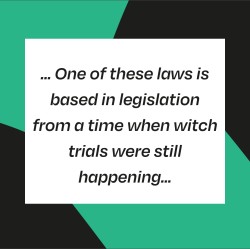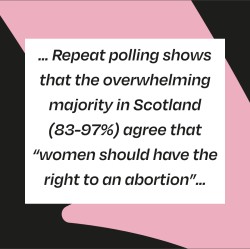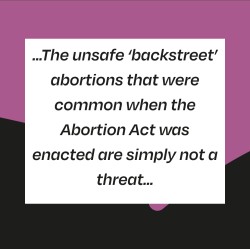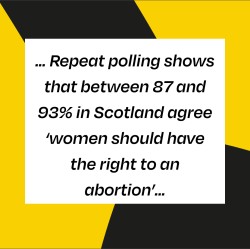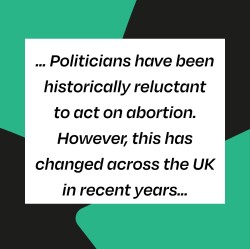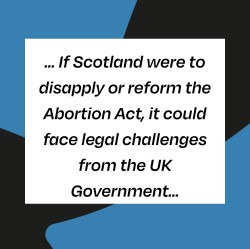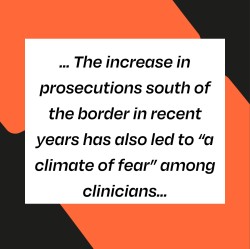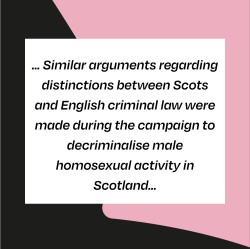Decriminalising Abortion in Scotland – Your questions answered
Posted on October 6 2025 at 10:33
Decriminalising Abortion in Scotland – Your questions answered
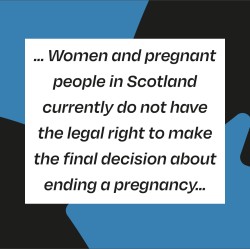 1. Is abortion legal in Scotland?
1. Is abortion legal in Scotland?
No. Women and pregnant people in Scotland currently do not have the legal right to make the final decision about ending a pregnancy. Instead, that power lies in the hands of doctors, two of whom must approve any request for an abortion. Other rules set out in the Abortion Act 1967 dictate how, where and when abortion can be accessed.
This adds needless complexity to routine healthcare, leading to delays and unnecessary barriers for those seeking care, especially for marginalised groups like those in remote and rural areas, disabled women, migrant women, young women and trans and non-binary people.
2. What is the law on abortion in Scotland?
The framework that criminalises abortion in Scotland is a patchwork of outdated law, with roots as far back as the 17th century. The Abortion Act, which governs when an abortion is permitted, dates from the 1960s.
These measures largely reflect the eras in which they were introduced and the degree of patriarchal control women were subject to at the time.
One of these laws is based in legislation from a time when witch trials were still happening.
3. Why do we need decriminalisation?
The law is in urgent need of modernisation: the criminalisation of abortion in Scotland is rooted in archaic law and the Abortion Act reflects the sexism and clinical practices of the 1960s.
Scotland is not meeting international health and human rights standards: World Health Organisation guidance is clear that abortion must be decriminalised and Scotland’s abortion law is not compliant with global human rights standards.
Criminalisation creates stigma: Abortion is treated differently from other forms of crucial healthcare under the law without medical justification, perpetuating stigma that prevents people from accessing routine care.
Abortion is crucial for gender equality and women’s rights: Access to safe abortion is essential for women’s rights to privacy, bodily autonomy, access to employment and education, financial security, housing, and health and wellbeing.
Support for abortion rights is widespread: Repeat polling shows that the overwhelming majority in Scotland (83-97%) agree that “women should have the right to an abortion”. All relevant professional healthcare bodies in the UK support decriminalisation.
Prosecutions for abortion offences have occurred in Scotland in recent years: We need to future-proof against an increase in unnecessary police investigations and prosecutions, which have caused profound harm to women elsewhere in the UK.
4. Would decriminalising abortion make unsafe ‘backstreet’ abortions legal?
One argument against decriminalisation claims it would legalise and lead to surgical ‘backstreet abortions.’ This is misleading. The Abortion Act strictly controls when, where, and how abortions can occur. Outside of this framework, abortion remains a crime.
In addition, 99% of abortions in Scotland today are medical, not surgical, meaning they are induced by pills. The unsafe ‘backstreet’ abortions that were common when the Abortion Act was enacted are simply not a threat.
Nor is specific law required to discourage them - as with other areas of surgical medicine, unsafe non-medical abortion would be covered by existing law.
5. Do people in Scotland support abortion reform?
Regular polling by YouGov shows that the vast majority of Scots are firmly in favour of abortion rights. Repeat polling shows that between 87 and 93% in Scotland agree ‘women should have the right to an abortion.’ Despite ongoing stigma and uncertainty surrounding abortion, partly due to its criminalisation, social attitudes in Scotland have shifted dramatically in recent decades.
Decriminalisation is recommended by the World Health Organisation, all relevant UK professional medical and healthcare bodies, UN human rights bodies, trade unions, and equality advocates. While abortion is often seen as a polarising issue in Scotland, the reality is very different.
6. Are politicians willing to take action?
Politicians have been historically reluctant to act on abortion. However, this has changed across the UK in recent years, with numerous positive steps forward. Northern Ireland has decriminalised abortion, making it available on request up to 12 weeks gestation.
The Westminster Government is in the process of decriminalising women accessing abortion (outside the rules in the Abortion Act) in England and Wales. Early medical abortion at home has been approved across Britain and ‘buffer zones’ have been established across the UK.
In 2024, the Scottish Government established an Abortion Law Review Expert Group, with the intention of introducing proposals for “reforms that ensure that abortion services are first and foremost a healthcare matter”.
7. Would abortion law reform face legal challenges from the UK Government?
Abortion was devolved to the Scottish Parliament in 2016, and it is open to the Scottish Parliament to pass legislation that amends the Abortion Act.
If Scotland were to disapply or reform the Abortion Act, it could face legal challenges from the UK Government, arguing that different abortion laws across the UK would cause problems. However, the likelihood of this is diminishing. The campaign for decriminalisation and reform of the Abortion Act is building at pace in England and Wales. In June 2025, the House of Commons at Westminster voted to pass an amendment that will decriminalise women who have an abortion outwith the rules in the Abortion Act. Meanwhile, Northern Ireland has always a different framework.
Anti-abortion groups will try to block progressive abortion law reform. However previous legal challenges, such as those on Northern Ireland’s safe access law and early medical abortions at home in Scotland, have been unsuccessful.
8. Why not focus on services rather than the law in abstract?
It has been argued that decriminalisation would be largely symbolic. This hinges on the misconception that the Abortion Act effectively decriminalises abortion in Scotland, England and Wales, and that its restrictions do not impinge on access to services. However, while access to abortion is straightforward in most cases, it is vital that the system works for everyone that needs care. The increase in prosecutions south of the border in recent years has also led to “a climate of fear” among clinicians who have to operate within uncertainty and the threat of criminal sanctions in the workplace.
We are clear that decriminalisation alone is not enough. We need a model of abortion care services that is patient-centred and based on best clinical practice, equality of access and human rights. This means reform of the sorely outdated Abortion Act in Scotland (as well as in England and Wales).
Meanwhile, equality of access for marginalised groups of women and pregnant people must be a core element of current work to improve services in Scotland. We need to see delivery of a national service to provide abortions up to 24 weeks and implementation of ‘buffer zones’ legislation to prevent harassment for patients and staff.
9. Is Scots criminal law more flexible than the law in England?
Decriminalisation of abortion is about removing an element of reproductive healthcare from the criminal law. These discussions do not benefit from a focus on the nature of the Scottish legal system and its perceived advantages over the English legal system.
Similar arguments regarding distinctions between Scots and English criminal law were made during the campaign to decriminalise male homosexual activity in Scotland. In England, this occurred in 1967 but the law in Scotland was not amended until 1980. It was argued this was not needed in Scotland as there were almost no prosecutions of private consensual homosexual activity because the common law was more flexible.
This misses the fundamental point that criminalisation, including debate around it, creates and embeds stigma, prejudice and fear. That this legal reform came so much later in Scotland is likely to have caused LGB people much harm. The parallels with abortion stigma and criminalisation are clear, and the impact of long overdue system-change on women and women’s equality must not be underestimated.
